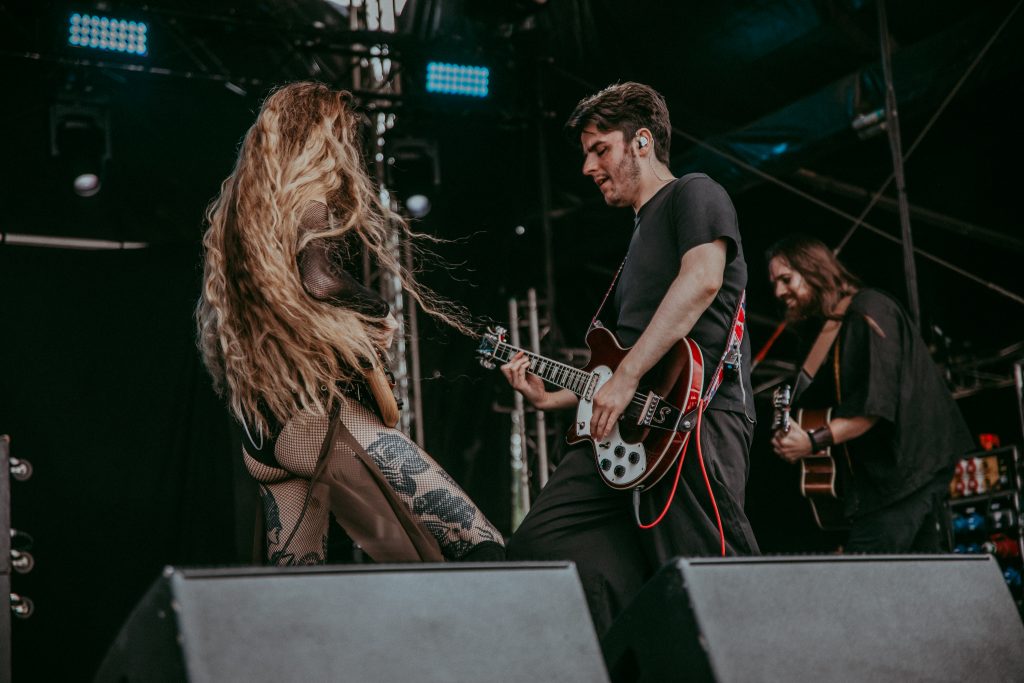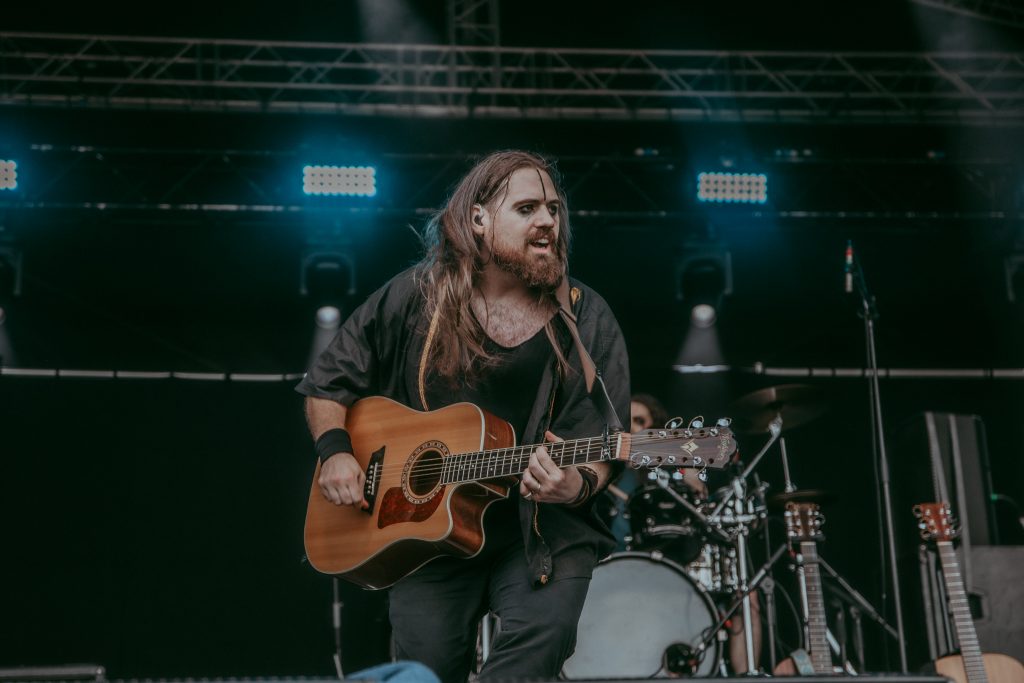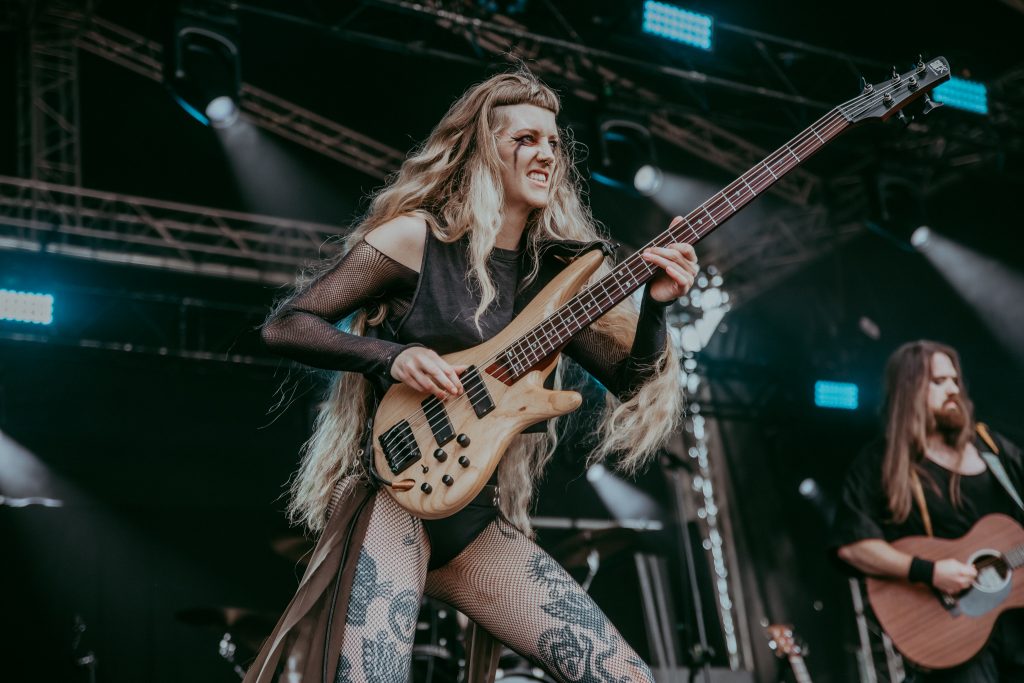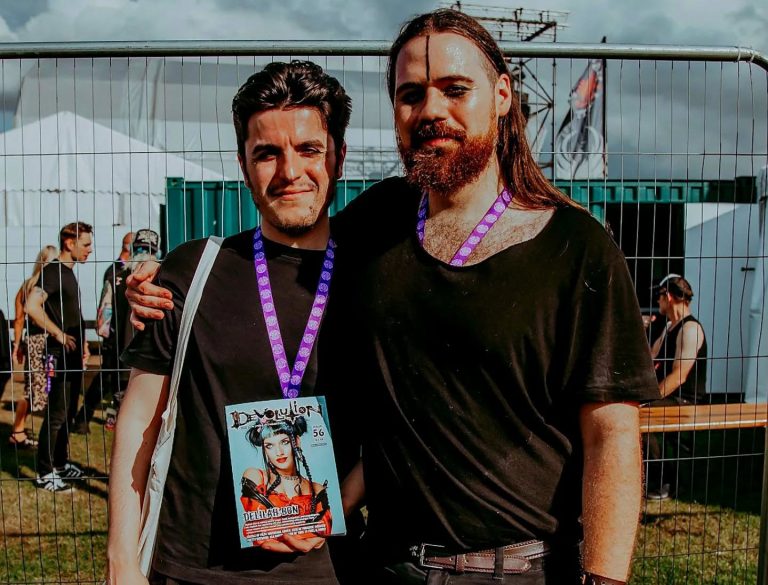We caught up with progressive folk rockers Flint Moore after their scintillating set at Maid Of Stone to learn about the band’s origins, the deep and emotional narrative of their debut album, ‘The Aches & The End’, and how this translates live while balancing the light and the heavy in their sound.
Let’s get some context on the band. You originally started out as a solo project back in 2014, and it has since clearly expanded. Could you provide a bit more detail about your band’s history, please?
Francis: Yeah, absolutely. We all kind of came together with different piecemeal bits and pieces from all sorts of different corners. Some of us met in college, others were just already friends as well. It took about six months for us to all kind of gravitate together. We went through different band members and tried to figure it out earlier on, and it kind of went from there to me and Noah. Then it was Lawrence.
Lawrence: I believe we had a little meet-up or something, just asking if you wanted to do some kind of project or something. I think you had asked Maddie, not long after that, was probably like a few months after… And then I think, literally, after that – probably a month after meeting and practising for the first time – we had an EP out with the first couple of songs. So we kind of hit the ground running as much as we could.
Francis: Yeah! And we’ve just been going for a while. To us now, it almost feels like ancient history, but it is still very much worth revisiting, as well.
Thank you for enlightening us as to how it all started! Clearly, you guys must have clicked very nicely to get an EP out so quickly, but Flint Moore – how did you stumble on that name?
Francis: Flint Moore came from an idea I had, which was a really cool idea in my mind, for literally a moor filled with flint, that kind of thing. And I like the kind of vibe of it! I suppose it conjures up quite nice imagery there. So one of the things that I read up on is that you’ve got a stated philosophy of “playing with, not at”. Could you explain and expand on that a little bit for us, please?
Francis: The thing is, that connection is key. Music when you don’t have that connection just sucks. The whole point, at least for me, with music is to connect with the people in front of me. It’s not a brand-new sentiment or anything of the sort, but it’s really important to me that it’s like a role, almost a servitude. You’re a band that is kind of the background music to somebody else’s life, even at the top of your game, you’re generally a song on somebody’s playlist, and so very much like the idea of creating that connection to a person.

So they can explore their own internal themes and ideas, rather than trying to impose my own.
Lawrence: Yeah, I was going to say it’s probably the most fundamental thing about being a live band. Like, it’s one thing to record and mix and put an album or an EP out there. But if you can’t make people feel involved when you’re playing live, if you’re not getting that interaction, I feel like you’re missing the most fundamental part of why people go out and see you, because they might as well just sit at home and listen on a nice pair of headphones. But we wanna get people involved when we’re playing. So that’s the fun bit.
One of the elements I took away from your show today and from listening to you is the element of almost like catharsis. It’s an emotional pull. So how do you feel you tap into that when you’re playing?
Francis: Life is suffering for us. Fundamentally, life is suffering. It is the lens through which we see everything, and that’s kind of a part of what I tap into. I love hope. I love joy. I love kindness. But I hate bullshit. I hate it when it is presented like these themes and ideas of something that’s floaty and almost Disney-like. Hope is incredibly important to our essence. We make stories for ourselves to just get through the day, through the week; make narratives of our lives. The frame in which we do this is from the groundwork that life is suffering, and life is literally what you make of it. If you want things to come to you, you must push hard, you must do well.
That’s a lovely sentiment – in your live performance, aside from that emotional catharsis and “playing with, not at”, who do you draw influence from, and what else might you draw influence from?
Lawrence: For me, I like to have lots of different soundscapes and things kind of in between. I also like very wall-of-sound, rocky, heavier stuff as well. And it’s not always the easiest to mix, especially when playing live. So for me, that’s what I need to do. I draw a lot of instances, very early on. I would listen to all the post-rock bands like Godspeed You! Black Emperor, Explosions In The Sky. But then I was also into kind of rockier and heavier stuff. So it’s always like… Probably for the last ten years, it’s been this kind of zigzagging to try to get to a perfect balance of it. So when playing live for me, it’s trying to create an atmosphere but also have the drive of rock. I’d like to have the best of both worlds with it. Have my cake and eat it!
Do you find trying to balance that more driven stuff versus the more atmospheric stuff can be a little bit tricky both in studio and live, or do you feel like it comes quite naturally?
Lawrence: I don’t think it’s that tricky because once you’ve done it in the studio, you’re just kind of working out how to make it sound good live. That adds extra layers and things that we normally do. But as long as you’re getting into it, you’re playing it, and you’re playing out to the audience as best as you can, that’s what people vibe to mostly. You can have a crazy setup, but if you’re looking like you don’t wanna play it, then you have kind of lost people, regardless.
Going on to the topic of your debut, ‘The Aches & The End’, we touched on it earlier with regards to your live performance and your philosophy that life is suffering, your music is your
Stories of getting through the day, but were there any specifics behind some of the music that prompted you to write the album that you have?
Francis: ‘The Aches & The End’ thematically came from when my life broke apart entirely, and I lost faith in everything. I had nothing to hold onto. All that I was left with was the sensation that I wanted my hope back, and I didn’t know how. So the songs follow that journey of understanding that something is wrong and then diving right down to when it gets awful, and then kind of climbing back up out of it. I feel that the album leaves off on a question mark, whether you want to go back down again or come back up the full way.

Would you say that there’s quite a strong mental health aspect to it?
Francis: Yeah, I would say there’s a strong mental health aspect. I think there’s also a large level of introspection to it as well. It’s hard to gauge because sometimes when you’re suffering, it’s mental health. Sometimes you’re suffering because your life genuinely does suck and you’re having an awful time because your life is awful at that point. I think both have their place to kind of think and reflect upon. This album, I put together with the rest of the band with the hope of finding that no man’s land, the kind of “I’m not at my absolute most awful, ready to kill myself; I’m not jumping for cloud 9, having a wonderful time. I’m lost in this grey. I wanna climb. I don’t really know where I’m going”.
A really good aspect to think about the album, there. We sort of discussed the songwriting, balancing the heavier and lighter elements. One of the things that you’ve mentioned in a previous interview is that you’ve got your big, anthemic songs, but equally, you’ve also got some of the songs on your earlier work that are quite long. How did you refine the process to get to where you are now?
Lawrence: Well, I think for us, we’ve done the longer stuff. Most of our songs were 6-7 minutes, or even longer and way past that. I think we just wanted to try and get across the same impact and emotion without over-indulging. We just wanted to trim the fat a lot and just kind of get it down into what makes it good. And I think it was quite hard really – some of our songs like ‘Undermask’ are very to-the-point and “wham, bam” and then it gets out. But I think it’s something that we needed to do to kind of grow as a band. I think we needed to kind of find that balance between having all the really more complex musical aspects to it, but then also bringing it home and making it. I don’t wanna say “understandable”, but it just makes it more accessible and digestible, because the last thing we want is to put all this effort into our music and have no one really understand it. We want to strike that balance, and I feel like we’re a band that wants to have our cake and eat it. I think that’s always been the challenge for us, to just write something cohesive, but have it not feel like people have been shortchanged. And I think it’s something we always tried to do, no matter what style we do or go for, you know, it could sound completely different, but I feel like the philosophy of that is still going to be the same. How do we match our tastes that we are now without copping ourselves out, selling out? Whatever that means.
It’s yet another fine balance between progressing and trying to refine things, while also not forgetting what sparked Flint Moore’s inception in the first place.
Lawrence: Yeah, we don’t wanna bore ourselves as much as other people!
Nonsense! In the same interview where you mentioned the differences in some of your songs, you also mentioned that you’re in the early stages of recording a new album. Can you tell us a little bit more about how that’s going?
Francis: Not really! It’s still in that floaty stage, where we start by asking a lot of internal questions and well, what Lawrence talks about. What do we want to say musically now? What are our influences, and how do we have our cake and eat it, too?
There’s a theme here: cake!
Francis: So all we can say is that it’s going to pick up from where the first album left off. So it’s going to continue the stories and the narratives and go on from there.
Looking ahead to the future, what can fans expect? What is the future for Flint Moore? When can we see you live again?
Francis: The future of Flint Moore… We’re still gonna make sure that it’s incredibly large. We love taking internal feelings that feel large and making them external. It’s a great joy of ours to take things that can be kind of emotionally confusing and turn them into something concrete.
One of the largest stories I get from our fans is the ones who message us with a very specific thing happening in their lives. They say, “This was happening. This was happening with my dad, and I wasn’t too sure about my sister, but this music really helped me during that time”. Those are the kind of stories that mean the most to me. That’s the kind of thing. Basically, come to our shows to be able to have that collective feeling, then listen to us in private if you wanna have a moment to look inside.

That’s a lovely sentiment, right? Once again, thank you so much for speaking with us today – we really appreciate it! Last question: Is there anything that you’d like to say to your fans and to the Devolution readers?
Francis: Thank you for reading all about music. People who read about music are generally the most interesting to speak to about music, so thank you for listening to this. You are part of a crowd of people I deeply appreciate, and the fans in general who are also reading this. Thank you for reading this. You’re keeping the music alive and well.
Lawrence: Hopefully, we’ll see you all on the tour this September as well! Thank you so much and enjoy the rest of the festival!
https://www.facebook.com/flintmooreofficial
Interview By Lee Carter
Photos By Rebecca Bush – https://www.instagram.com/beckybphoto/


